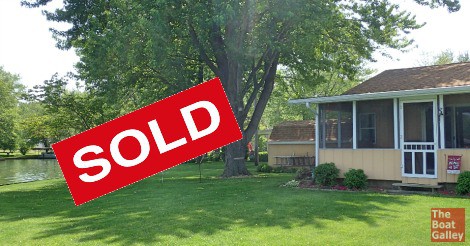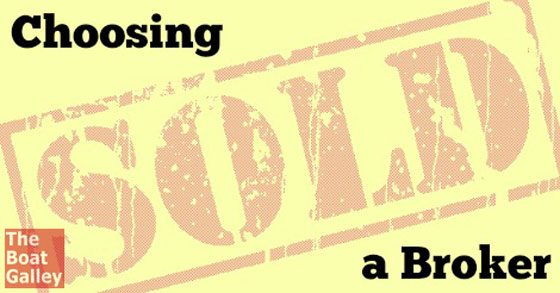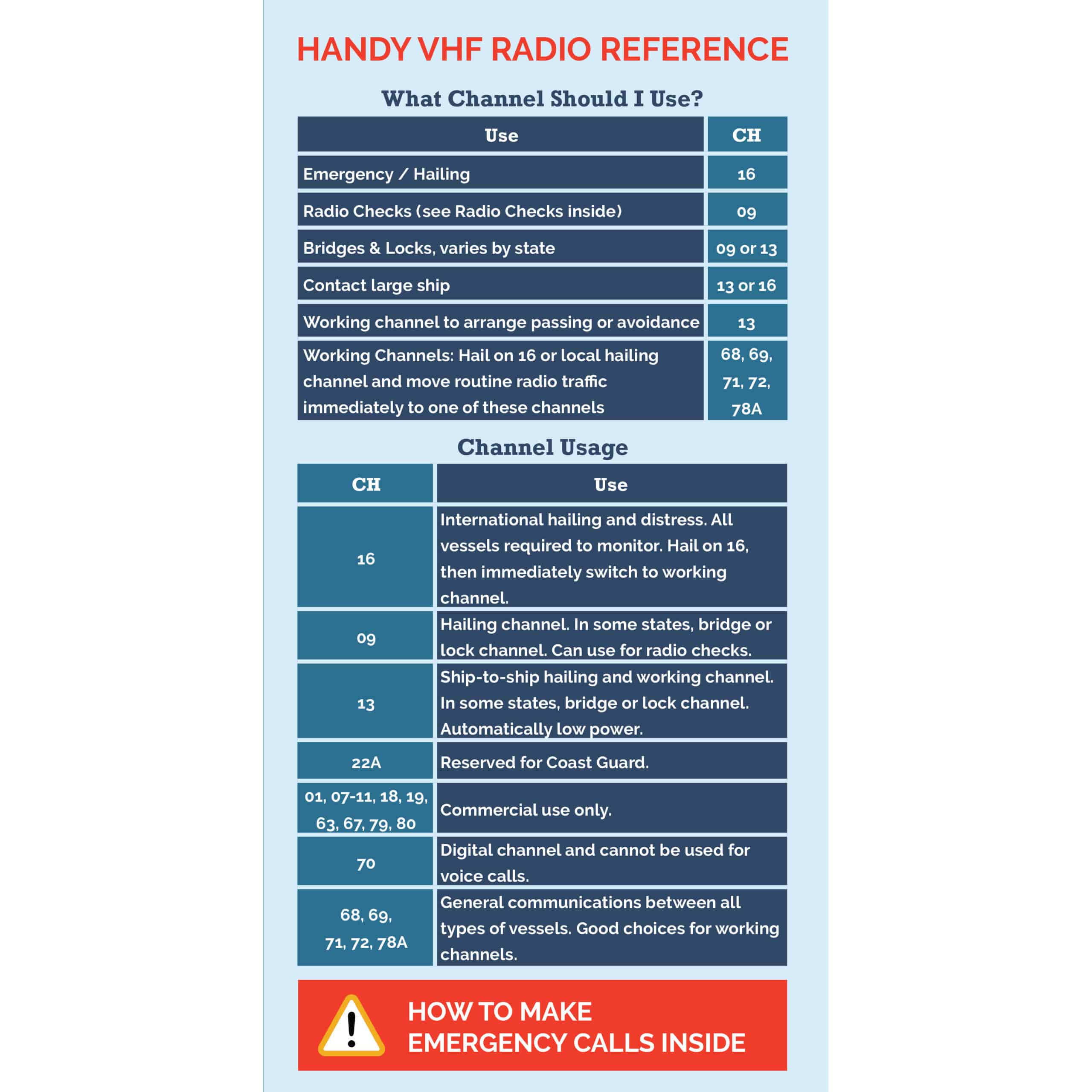If you’re selling your boat — or your house to move aboard the boat — you are probably at least thinking of finding a broker.
And unless you’ve previously had a great experience with a certain one, or otherwise know one that you think does a superb job, you’re probably wondering how to find “the right broker.” I’ve gotten questions from several people about choosing a broker and several more asking why we decided to sell our house ourselves.
In my book, the right broker is worth every cent of their commission (typically 6 – 7% for homes and 10% for boats). But a bad broker is worse than useless as your house/boat becomes “dated” on the market and then people start wondering what’s wrong with it.
To me, selecting a broker is something that you need to do carefully. You don’t want to just pull a name from the Yellow Pages. Selling a boat or house is a big transaction and you want someone who is going to get results. Getting a good price is important, taking care of all the documents correctly is also important, but making it all happen in a reasonable time frame is key. Marketing is paramount.
Although what they’re selling is different, how I go about selecting a broker is pretty much the same for either a boat or a house.
Somewhere, you’re going to develop a list of possible brokers, from the internet or the Yellow Pages. But don’t call them to set up an appointment yet!
What I then do is take a look at some of their listings and see how well presented they are. Are the pictures clear? Did they have the owner remove clutter and clean the place up? Did they choose a sunny day? Do the photos show the features well? Does the write up make the boat/house sound interesting? Highlight important features . . . and tell you why these things are important? Does the ad seem pretty generic? Look at the ads as though you were a potential buyer and see if they would make you want to inquire further.
Most initial searching is done online these days and a poor online listing translates into few inquiries. When we bought Barefoot Gal, I was really disappointed in many of the ads that I looked at. There was obviously wrong information (a catamaran listed as a monohull, for example) and many cases where the details/specifications were only one to two sentences, usually including the phrase “you have to see.” Most often, we didn’t.
 When you’ve found a few brokers that interest you, my next step is to walk or drive by some of their listings — and not just the high dollar ones. Check out some that are similar in price to what you think your boat or house will go for (you want to see what they do in similar circumstances). Is the signage good? Is there an InfoBox (“Take One”)? Does it have anything in it? Grab one and see if it’s well done. A nifty feature that I’ve seen technology-savvy brokers use is to put a QR code (shown at right) on the signs and flyers — scanning this with a smartphone will take the potential buyer right to the full listing so they can get all the info standing right there. (Note: if you’re selling yourself, you can get a free QR code for any web address).
When you’ve found a few brokers that interest you, my next step is to walk or drive by some of their listings — and not just the high dollar ones. Check out some that are similar in price to what you think your boat or house will go for (you want to see what they do in similar circumstances). Is the signage good? Is there an InfoBox (“Take One”)? Does it have anything in it? Grab one and see if it’s well done. A nifty feature that I’ve seen technology-savvy brokers use is to put a QR code (shown at right) on the signs and flyers — scanning this with a smartphone will take the potential buyer right to the full listing so they can get all the info standing right there. (Note: if you’re selling yourself, you can get a free QR code for any web address).
I then call and/or email for more info, generally with specific questions. The speed of the response and completeness will tell you a lot! Basically, just think “Is this how I want questions about my boat/house answered?”
I’ve never gone so far as to view a boat or house as though I were a purchaser while evaluating a potential broker, thinking that I had a good enough feel for someone from the call or email.
After I went through this exercise with the local realtors for our house, Dave and I decided that we weren’t impressed with any of them. None stood out as knowing the lake or what was important about buying a lake property. And two friends who had sold their houses on the same lake had all ended up selling it themselves — after having no bites while they were listed with a realtor.
While the initial assumption is that people who are selling a property or boat “by owner” are too cheap to pay a broker, I don’t think that’s usually the case. It wasn’t for us. We simply felt that we could market the house much more effectively ourselves. [Follow up note: we got a great offer just 12 hours after we put it on the market — all the time and effort we put into marketing it paid off.]
I don’t want to sound like I’m down on brokers at all. As I said earlier, a good broker will have the contacts and know-how to get your property sold quickly. They are a huge help and will earn their commission. But if the right broker isn’t in your area, it may be time to tackle the job yourself.
One quick additional note based on personal experience: don’t simply go with the broker that suggests the highest listing price for your boat/house — particularly if it’s well above what others suggest and what your gut says you can get — even if they’re “confident” they can get that price. Go with the one that you think will actually get it sold!
Any other tips or thoughts on choosing a broker?

Flatten the learning curve with practical how-to info that gives you the confidence to step into life aboard.
Start Learning Today

Carolyn Shearlock has lived aboard full-time for 17 years, splitting her time between a Tayana 37 monohull and a Gemini 105 catamaran. She’s cruised over 14,000 miles, from Pacific Mexico and Central America to Florida and the Bahamas, gaining firsthand experience with the joys and challenges of life on the water.
Through The Boat Galley, Carolyn has helped thousands of people explore, prepare for, and enjoy life afloat. She shares her expertise as an instructor at Cruisers University, in leading boating publications, and through her bestselling book, The Boat Galley Cookbook. She is passionate about helping others embark on their liveaboard journey—making life on the water simpler, safer, and more enjoyable.










Mindee Cobb says
One of the main reasons we used a broker to sell our last two houses is that they brought us qualified buyers, not just every Tom, Dick and Harry who wanted to “window shop.” Also, the closing process for a home is something I’d rather hire a professional to do.
Mark and Cindy - s/v Cream Puff says
We found it very easy to qualify buyers ourselves by asking a few key questions. We hired an attorney to close for a $1,000. This is a lot less than the 3% a listing broker would take.
Mark and Cindy
s/v Cream Puff
Carolyn Shearlock says
You can get a real estate attorney to handle the closing if you decided to go the “For Sale By Owner” route. I wouldn’t let the closing be what makes you use a broker if you don’t think they are giving marketing value.
Carolyn Shearlock says
If they do bring qualified buyers, that’s great. That’s a good broker and worth the commission.
Mark and Cindy - s/v Cream Puff says
Great post!
We used a broker when selling Cindy’s business. It was a bad experience even after we did all of our homework. We wound up firing the broker and selling the business ourselves. We were listed with the broker for over a year with only one offer that fell out on the last possible day after costing us over $10,000 in attorney and accounting fees. We sold the businesses ourselves within 3 months for a higher price and saving 10% commission.
When it came to selling the house, we used a discount broker. We paid a flat fee of about $600 for the MLS listings and agreed to pay the buyers agents 3%. The house sold within 60 days. We saved half of the commission compared to using a full service broker. We were told by a full service realtor that about 85% of people purchasing find the house first on the internet leading me to ask the question, “then why do we need a selling broker?”. Their answer was, “staging”. We thought 3% of the value of the house for a staging consultant was ridiculous. We looked at pictures and did it ourselves.
When buying Cream Puff, we used a broker and had a wonderful experience. We require the broker to do the homework on a potential boat prior to us viewing it. This really worked well for us. I do not think I would ever buy a boat without a buyers broker.
Mark and Cindy
s/v Cream Puff
Adam House says
We’re are in the middle of deciding when we will move aboard a boat.
The Boat Galley says
Big decision!
tami says
I’m in the ‘find a good broker’ camp.
Our house is in contract after only two weeks’ listing. It’s an unusual house, and our broker sifted out all the looky-loos (and lu-lus). I wish I could double his commish for all the trouble he’s saved us and for his knowledge of our particular market.
I’d suggest looking at the broker’s listings and seeing if he or she is dealing in the same sort of property that you’re selling. If a broker is selling redundant cookie-cutter houses, he’s probably not going to be what you want for a custom built Frank Lloyd Wright style house. Same for boats – if a broker is dealing in Benehunterlinas, you don’t want him for your Schionning.
Florian Wolf says
When we bought our classic timber gaff ketch we didn’t use a broker, as more or less all of them in Australia are completely inexperienced when it comes to classic wooden boats and tell you a lot of ‘wishful thinking’. After 6 months of intense searching and evaluating dozens of classic boats we bought our “Seascout” privately, essentially on a handshake but with a subsequent contract to follow-up, from private vendors who had entirely rebuilt and restored the ship from the ground up & sailed and lived on it for years. They were honest people, told us everything they knew about the ship, showed us all the details, all the nuts & bolts, nooks & crannies, and also the not so great sides – some leaks in the deck, a bit of rot over the wheelhouse door, toilet not working etc. We also employed a wooden boat surveyor who has regular contact with timber boats, and when his report was satisfying we took the plunge and bought “Seascout” in a day. In addition to the boat we got all their tools – rusty, but working – and all spare Tasmanian timber for the boat (even all the bags of sawdust to fix a leak quickly when at sea). Of course there were some things that surfaced afterwards, but we met the previous owners over that, had a chat, and it turned out even they did not see these things coming. We’re still in regular contact three years after the ship changing hands and consider each other good mates.
Involving a broker in our case would not have changed anything to the better, as the really good classic boat brokers are all overseas – it would just have cost us money not wisely spent. If you do your homework with detailed check lists (very important: detailed check lists for everything – I cannot emphasize this strongly enough !!!) and put some gentle safeguarding clauses into the contract you should be fine. However, if you are not selling / buying a classic treasure, but a production-line boat things may be different, so make up your mind, take the plunge, and importantly: don’t look back and chastisize yourself – if you love your boat nothing else matters, broker or no broker.